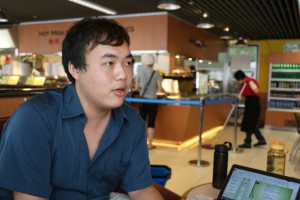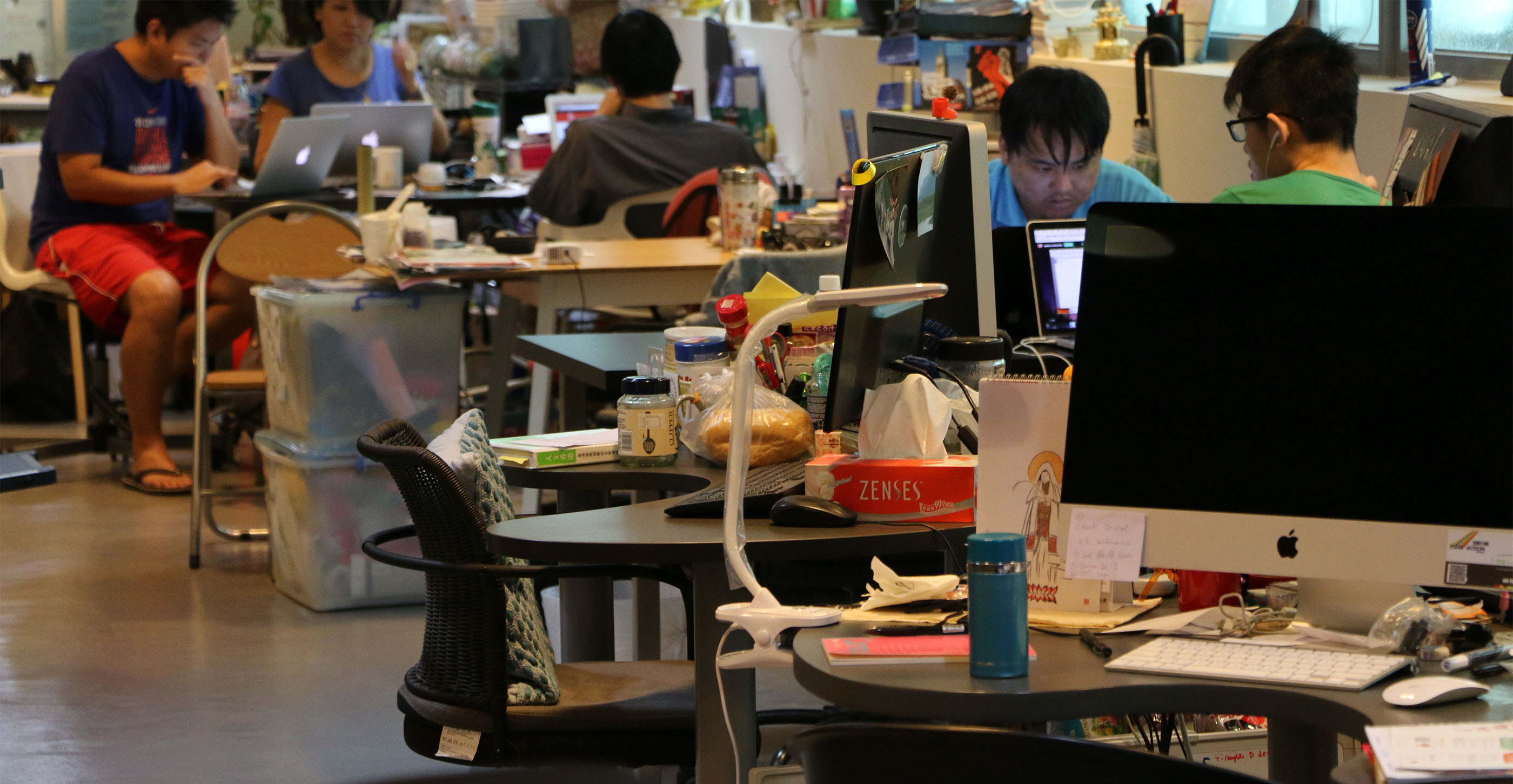Youngsters face pitfalls as they chase their freelance and start-up dreams
By Kate Kim & Vivienne Tsang
Chandni Chotrani picks up her camera, looks for the perfect frame and takes the shot.
After finishing secondary school two years ago, Chotrani followed her instincts and her knack for photography. She asked her parents for a gap year so she could decide if this could be her life-long career. She is currently working as a freelance photographer.
Chotrani says being a freelancer is not as carefree as people might think. “It’s down [to me] on my own feet,” she says. She has to brush up on her photo-taking skills, reach out to potential clients, and maintain her website. It is challenging but she says she does enjoy her life now.

Brothers Jonathan and Eric Chiu are also choosing to strike out on their own. After earning good salaries, they decided to quit their jobs to establish their own start-up. “I don’t want to work for someone,” says Eric. “I’d be making money for the employer.”
The brothers, admirers and devotees of the success stories from the Silicon Valley, are the co-founders of Lime Inventory, an app that simplifies stock-taking for restaurants and bars.
Despite the ups and downs of running their own business, the brothers are optimistic they can become lifelong entrepreneurs. They do not want to go back to regular employment because in their eyes, freedom means everything. “I would rather be poor and die trying,” says Jonathan.
The Good Lab, a co-working space where the Chiu brothers are now based, aims at enabling like-minded people to collaborate and develop their businesses. Ada Wong, its director, came up with the idea of establishing this space through her personal observations. She noted that many cities in the region already have co-working spaces of their own. “I’m just following the trend worldwide.”
Start-ups are just one dimension of the changing nature of work for young people. With the advancement of communication technology, many of them opt to work part-time or as freelancers. For some millennials, the traditional features of work – a fixed place of work, regular hours and constant contact with colleagues – are no longer familiar.
Foster Lam Yuen-ho, a social worker who specialises in career counselling for teenagers, says youngsters in the past were only concerned about the economic benefits of employment. Working was a means to survive. But young people now expect more from work, for example, job satisfaction and being able to contribute to society. He says flexibility and the autonomy to control their own life, have become key considerations.
Lam says that since more young people prefer part-time over full-time jobs, employers tend to offer contract-based or part-time jobs. But this is only part of the picture. While some youngsters might opt to work freelance or part-time, others might soon have no choice.
According to a recent report published by the International Labour Organization, the world labour market is undergoing a vigorous shake-up that is changing the meaning and nature of work. In advanced economies, the standard employment model is less dominant, and full-time, stable contracts represent less than one in every four jobs.
Jonathan Chee, project director with the Centre for Entrepreneurship at The Chinese University of Hong Kong, agrees with the finding. He says past studies show that large corporations like LG and Samsung used to be major recruiters but people now realise big companies are no longer reliable. They hire more people during good times and fewer people during bad times. Companies can save money by hiring freelance or short-term staff who may not be eligible for benefits and protections. As it turns out, neither big nor small companies are safe shelters for full-time employment.
“Along the line, the path of your life, you face the same risk,” says Chee. He believes the reason more people start their own businesses is because there is no longer any certainty in life and they realise it might be better to strike out on their own.
Young people’s concerns about job security and conditions are not unfounded. A report from the Statistics and Census Department in 2011 found the median monthly income for youth aged from 15 to 24 was HK$8,000 in 2011. That was basically the same as in 2001.

But freelancing and entrepreneurship are not foolproof solutions. Brian Ho quit his full-time job at Ernst & Young and joined the freelancer world a few years ago. Ho, who founded the Hong Kong Freelancer Network, says freelancing allows talented people with in-demand skills to fill gaps for those skills in the market.
The Network first appeared as a Facebook page in 2012 for people to post and apply for freelance jobs. Although it is open to all freelancers, most of the job postings are for programmers and graphic designers.
Ho, who now teaches in the School of Design at The Hong Kong Polytechnic University, says freelancers have to rely on themselves. Whenever they take a job, they are under a lot of pressure. Sometimes, freelancers simply have no one to talk to or to ask for help from. “The biggest fear for a freelancer is isolation,” Ho wrote in the introduction to his Network website.
While people commonly believe being a freelancer means having control of one’s own life, Ho explains you can also run out of money in a short period of time or not get any jobs for more than a year. “Freelancing is not for all people,” says Ho.
Christopher Hugentobler, a co-founder of the HKU Alumni Entrepreneurs Club, also points out the potential pitfalls of working for yourself. “It’s very sexy to talk about young entrepreneurs,” says Hugentobler, “but actually, most of those people fail.”
The HKU Alumni Entrepreneurs Club was established this year to create a community for entrepreneurs who graduated from the University of Hong Kong to share their experiences and business frameworks.
Hugentobler, himself a fresh graduate, is realistic and serious about entrepreneurship. He points out many people are not aware of the risks entrepreneurs take when they establish companies and work for years without income.
For him, a successful entrepreneur needs to be a hustler as well as being creative and highly competent. She or he has to be able to respond to changing events around them and communicate with people.
Sung Ka-wing, a final-year student at Chinese University, is also passionate about launching his own start-up. He got one step closer to his goal when he won third prize in the 2015 China Youth Internet Venture Competition for an idea to start a network for innovative tech start-ups.

However, his family strongly opposed his plan to start his own business. He feels immense pressure to find a well-paid and stable job after graduation and support the family.
Sung has no choice but to compromise. He has sent out job applications to a number of investment banks and plans to “work for his family” if his start-up does not turn a profit before he graduates in May next year.
Family pressure has also taken its toll on Olivia Tam Oi-kwan, now 35, who has worked as both part-timer and freelancer on and off for nearly 10 years. She has sacrificed a more stable and perhaps higher income in exchange for a life she desires.
Tam recalls that when she was preparing for the Hong Kong Advanced Level Examinations, she came across a required reading about the meaning of life. It became a reason for her to embrace non-regular employment.
She says her income from working as a freelancer or a part-timer can support her simple life, which she is satisfied with. However, as Tam was approaching her thirties, her mother was still worried about her having enough money to live on. This was hard on Tam who further stresses that she cannot afford to give her mother any allowance. Although she has an elder brother and sister, their incomes are only sufficient to support their own children.
Describing herself as a traditional person, Tam found her mother’s love and anxieties as well as the responsibility she felt about supporting her mother became an emotional burden. She eventually chose to compromise and gave up her ideal way of life. She has now found a full-time job.
While some young people may enjoy following alternative employment patterns, Alicia Leung Shuk-mei, associate professor at the School of Business at the Hong Kong Baptist University, says there are positive aspects about traditional workplaces.
Leung believes a physical office can serve as a binding force for employees, and a setting for people to brainstorm ideas. “People can discuss while eating, or when even using the bathroom.” She notes that companies like Google are working hard to improve the work environment. In this way, employees may find the office much more like home and possibly work longer.
A common workspace and regular employment contracts can give workers the collective strength to bargain for better pay and conditions. No matter how the nature of work has changed, Mung Siu-tat, chief executive of Hong Kong Confederation of Trade Unions, points out that “you are still a worker”.
Mung says that unfortunately some freelancers do not perceive themselves as workers and do not consider the need to join trade unions. They believe they are distinguished from other workers because of their autonomy and freedom.
In contrast, Working Today, an American non-profit advocating the rights of independent workers, founded the Freelancers’ Union in 2003. The union works to bring benefits to freelancers such as providing health insurance plans for its 275,000 members.
As for young people who choose the start-up route, Mung says Hong Kong business and industries are highly concentrated and start-ups could be thrown into “a sea of sharks”. He says that only when the government can facilitate a more humane working environment as a whole, would young people have a real choice of work. In the meantime, no matter how much the world changes, he believes “power comes from organising.”
Edited by Benny Kung











































